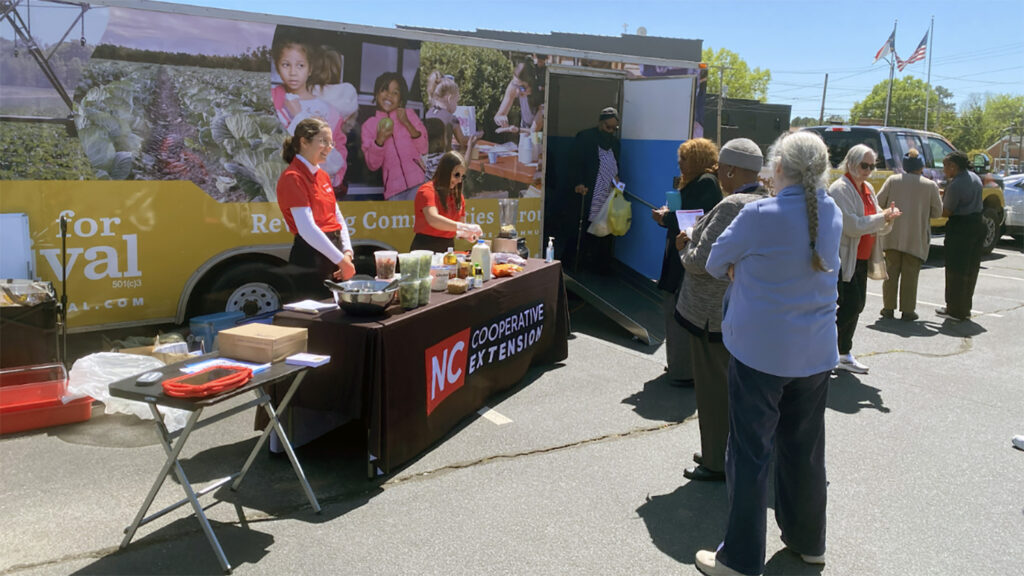Driving Community Resilience Through Fresh Food
go.ncsu.edu/readext?1091840
en Español / em Português
El inglés es el idioma de control de esta página. En la medida en que haya algún conflicto entre la traducción al inglés y la traducción, el inglés prevalece.
Al hacer clic en el enlace de traducción se activa un servicio de traducción gratuito para convertir la página al español. Al igual que con cualquier traducción por Internet, la conversión no es sensible al contexto y puede que no traduzca el texto en su significado original. NC State Extension no garantiza la exactitud del texto traducido. Por favor, tenga en cuenta que algunas aplicaciones y/o servicios pueden no funcionar como se espera cuando se traducen.
Português
Inglês é o idioma de controle desta página. Na medida que haja algum conflito entre o texto original em Inglês e a tradução, o Inglês prevalece.
Ao clicar no link de tradução, um serviço gratuito de tradução será ativado para converter a página para o Português. Como em qualquer tradução pela internet, a conversão não é sensivel ao contexto e pode não ocorrer a tradução para o significado orginal. O serviço de Extensão da Carolina do Norte (NC State Extension) não garante a exatidão do texto traduzido. Por favor, observe que algumas funções ou serviços podem não funcionar como esperado após a tradução.
English
English is the controlling language of this page. To the extent there is any conflict between the English text and the translation, English controls.
Clicking on the translation link activates a free translation service to convert the page to Spanish. As with any Internet translation, the conversion is not context-sensitive and may not translate the text to its original meaning. NC State Extension does not guarantee the accuracy of the translated text. Please note that some applications and/or services may not function as expected when translated.
Collapse ▲For many rural North Carolina families, finding affordable, fresh produce isn’t just an inconvenience — it’s a challenge that impacts health and well-being. Limited grocery store options, higher prices at small markets, and long travel distances mean that fresh fruits and vegetables are often out of reach.
NC State Extension is working to change that. Through a new partnership with Ripe for Revival, a Rocky Mount-based nonprofit, Extension is helping bring a mobile produce market directly to communities in need — and putting healthy food within reach for hundreds of residents.
Thanks to combined funding from the Danone Institute North America (DINA) Sustainable Food Systems grant and NC State’s Global One Health Seed Grant, the initiative will expand into eight rural counties through July 2027. The program will provide eligible participants with monthly $20 vouchers to redeem at Ripe for Revival’s mobile market — a retrofitted school bus or trailer stocked with locally grown produce, eggs, dairy and meats.
“Our goal is to make fresh, healthy foods more affordable and accessible while reducing the stigma often associated with food assistance programs,” says Basheerah Enahora, Extension nutrition specialist in the Department of Agricultural and Human Sciences, who leads the project. “We’re not just feeding families, we’re strengthening community health and supporting North Carolina farmers.”

NC State Extension and the nonprofit Ripe for Revival have partnered to expand a mobile produce market program for rural North Carolina communities.
Growing Access to Fresh Foods
The mobile market is more than just a grocery stop — it’s a community hub. Ripe for Revival purchases surplus crops from North Carolina farmers and sells them at prices about 20% below retail. By sourcing locally, the market helps keep farm income in the region while offering families fresher, more affordable food.
Through Extension’s involvement, the mobile market experience will also feature live cooking demonstrations, recipe cards and educational signage highlighting the benefits of healthy eating. Each of Extension’s county centers will help connect eligible participants to the program, with vouchers distributed through existing Extension programs such as the Expanded Food and Nutrition Education Program (EFNEP) and SNAP-Ed (Supplemental Nutrition Assistance Program-Education).
Voucher recipients will be able to shop once a month for three consecutive months, choosing from a variety of fresh produce and other essentials.
“The flexibility and dignity of choice are key,” Enahora says. “Participants select the foods that work best for their families, without feeling singled out.”
Ripe for Revival has been bringing fresh food to underserved communities since 2022, with its mobile market currently serving 23 counties. NC State Extension began collaborating with the nonprofit in late 2024, piloting the program in Washington County through the CDC-funded Healthy Roots initiative. The first market there drew 80 patrons and distributed more than 300 pounds of produce in a single day. The enthusiastic community response — coupled with support from local partners — allowed Ripe for Revival to establish a permanent weekly market in Washington County for 2025.
With DINA and Global One Health funding, the program will expand into Bertie, Halifax, Hertford, Lenoir, Northampton and Washington counties, along with Jones and Warren counties, supported through the seed grant. Over the next two years, the team will track the program’s impact by collecting data at the start, midpoint and conclusion of each participant’s involvement.
Measurements will include fruit and vegetable intake, food and nutrition security status, overall dietary behaviors, blood pressure, height and weight, along with voucher redemption rates and purchasing patterns. This research will help determine how effective the mobile market and voucher program are in improving nutrition and reducing food insecurity, which could inform similar efforts statewide.
Cultivating a Resilient Plan
The mobile market model addresses multiple challenges at once, making it a powerful tool for strengthening both farmers and families. By offering discounted prices and monthly vouchers, it reduces the financial burden of buying healthy foods. At the same time, purchasing directly from North Carolina farmers helps sustain local agriculture and supports the state’s economy.
“This program is a win-win,” Enahora explains. “Families gain access to healthier food, and farmers have a reliable market for their products. It’s about creating a more resilient food system for everyone.”
Enahora envisions this as just the beginning. “Our hope is that the model we build here can be replicated in other rural communities, not just in North Carolina but across the country,” she says. “By bringing healthy foods directly to where people live, we’re removing barriers and investing in long-term community health.”
With a clear plan, strong partnerships and a shared mission, NC State Extension and Ripe for Revival are working to ensure that fresh, local food is not a luxury — but a standard — for every North Carolina family.

Basheerah Enahora (third from left), Extension nutrition specialist in the Department of Agricultural and Human Sciences, with investigators from East Carolina University and Ripe for Revival working on the DINA grant.
[This article was written by Jessica Williams for CALS News.]

